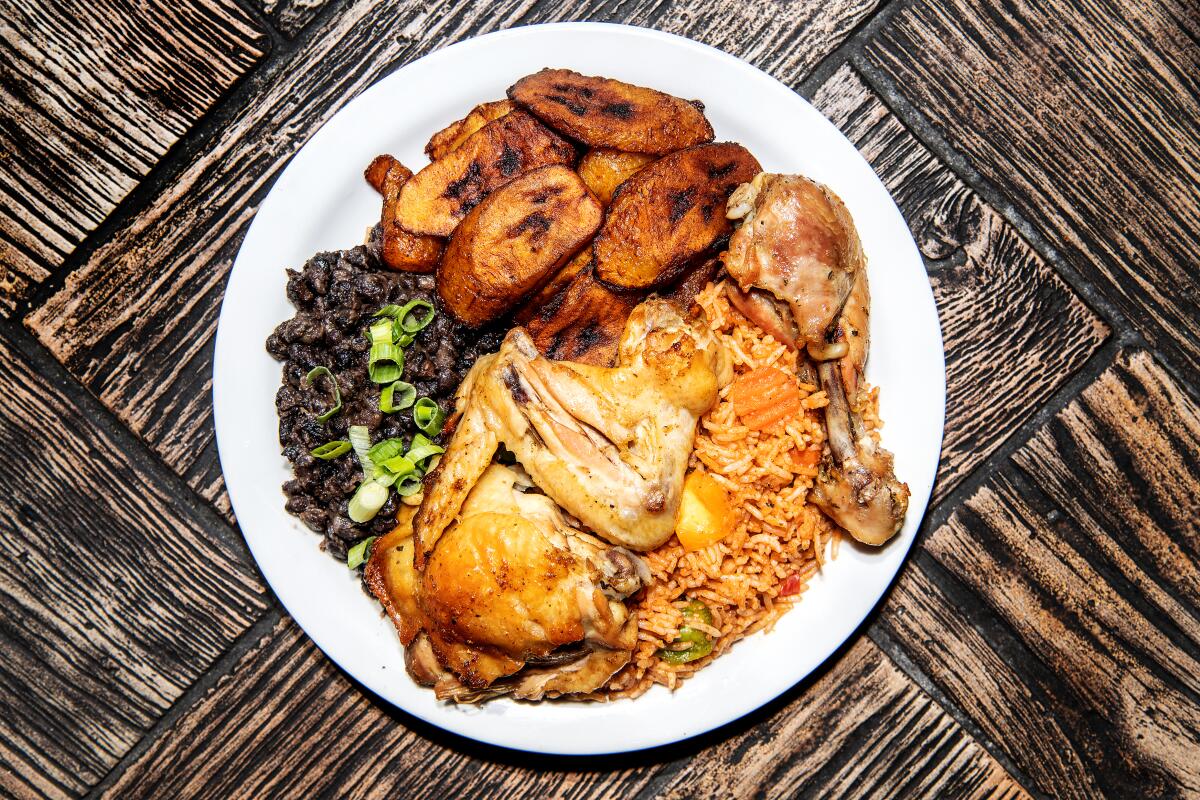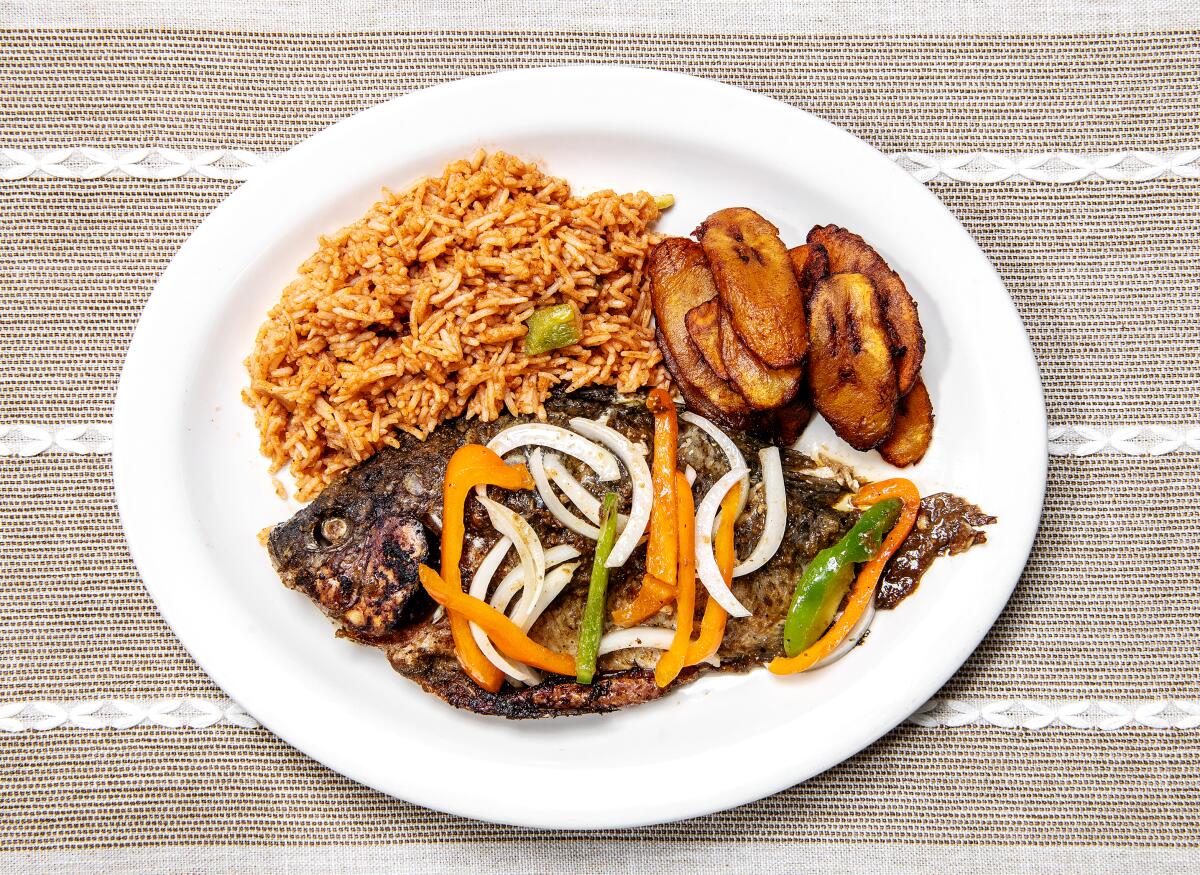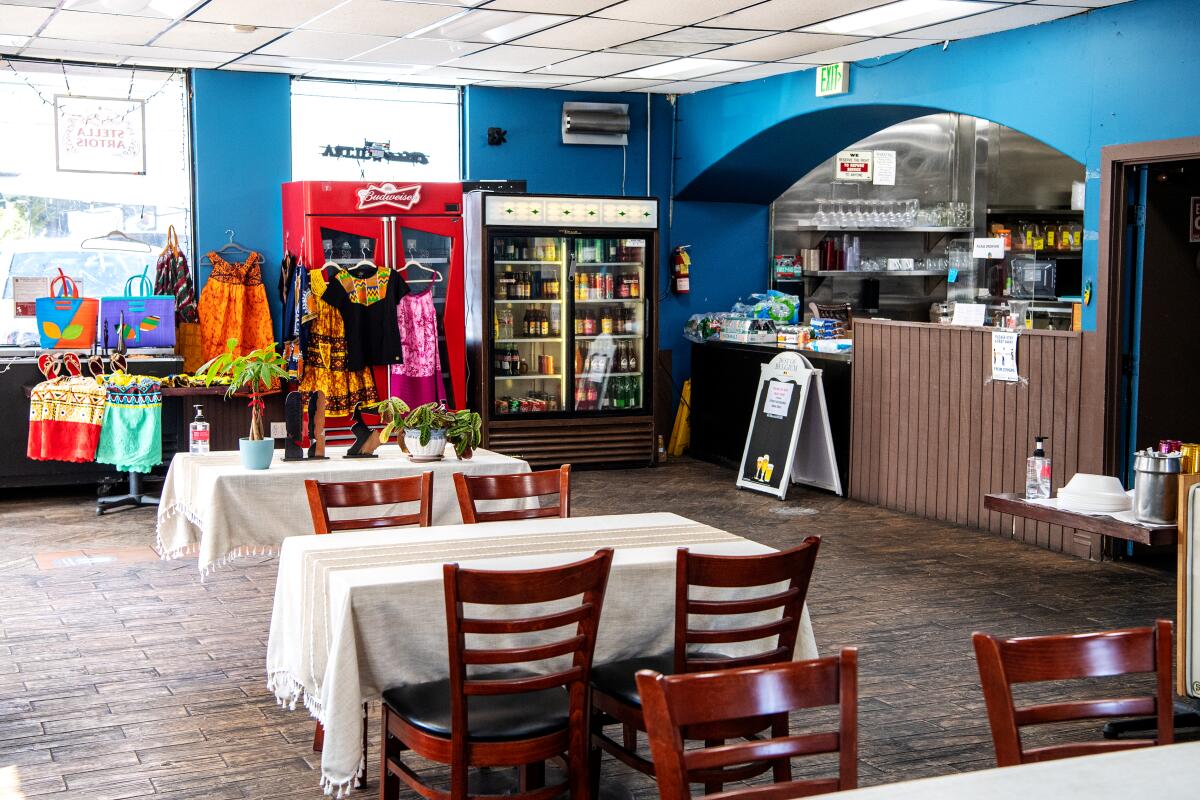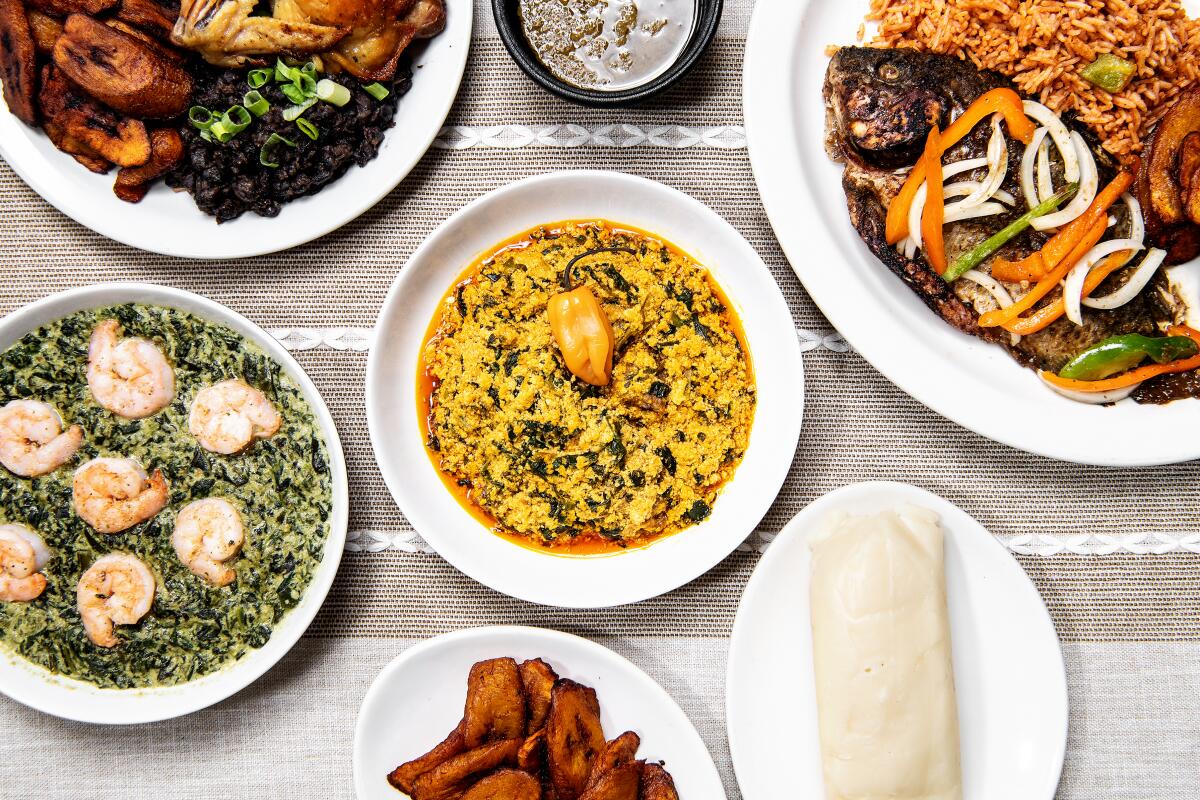At Mama D’s, eureka moments for anyone new to Cameroonian flavors

- Share via
Claudia Wanki concedes that the name of her 8-month-old restaurant, Mama D’s African Cuisine, reveals the genesis of her cooking only in the broadest sense: 54 nations share the planet’s second largest continent. She says you know that a restaurant specifically serves the food of Cameroon, her home country at a verdant nexus of western and central Africa, when you see two quintessential dishes on the menu: ndolé and eru.
To some eyes ndolé may look like the creamed spinach served alongside New York strips in clubby chophouses, though the similarities end in its soothing swirl of greens and beiges. Ndolé, also called bitter leaf (or Vernonia amygdalina, part of the daisy and sunflower family), is shredded and then simmered with aromatics and ground peanuts until most of the water boils away. A few handfuls of mild waterleaf (or, barring its availability, spinach) eases ndolé’s bitterness; a seasoning of dried crayfish unleashes umami that tastes more of earth than sea.
Beef, chicken or fried tilapia are options to complete the dish, though customers tend to select the fourth choice, shrimp, for their bounce and sweetness — and also, honestly, for their photogenic appeal. If Mama D’s has whizzed by on your social media scroll recently, you’ve likely glimpsed the ndolé.
Wanki most loves eru, also a stew of greens but with a different, forest-dense richness. Okazi, the leaves of a climbing vine, are cooked down with chopped pieces of beef stew meat, tripe and cow’s foot until the textures are melded and nearly indistinguishable. Palm oil adds nuttiness and carroty sweetness. You can’t see its telltale red-orange glow in the black takeout container — at least not until you dip in a mound of fufu, molded in your hand and indented with your thumb for better scooping. Then the palm oil bleeds and stains, and the mellow, meaty flavors coalesce, and you understand why it’s Wanki’s favorite.
She has admonishments before you eat it. “Use the pepper sauce on the table for everything except the eru. It will ruin the flavors!”
Her mother, Dorothy Wanki, doles out similar reproofs at her restaurant, Mama Dora African Cuisine in Takoma Park, Md., just outside Washington, D.C. Claudia and her seven siblings grew up cooking with their mother — she was also good with numbers and kept the books — although she never really planned to start her own outlet of the family business.

In June 2016, Claudia came to visit her older sister in downtown L.A. She let the Southern California sunshine seep in. She watched the constellations of skyscrapers light up on the roof of her sister’s apartment building. She thought, this is it. A month later she had moved to Los Angeles.
While working as a substitute teacher and a senior caretaker and finishing an MBA degree from Marymount California University, Wanki would sometimes order takeout from some of the Nigerian and other West African restaurants across L.A. The flavors were comforting in their familiarity, though nothing really conjured her family’s Cameroonian recipes. She knew she could duplicate them in a professional kitchen. In the middle of the pandemic, with her mother’s support, she leased the Boyle Heights building that previously housed Puertos del Pacifico. It sits independently in the parking lot of a strip mall along an ever-busy block of South Soto Street.
Customers are welcome to sit in the dining room, with booths along the windows and a few tables draped in beautiful embroidered cloths, though the food remains packed to-go. Wanki is often a one-woman operation; she’s still transitioning to sit-down service (including purchasing nondisposable tableware) and delivery remains a big part of her business.

None of this should keep you from Mama D’s. The regionality and tremendous care in the cooking clicks smoothly into the jigsaw puzzle of L.A. dining — a satisfying, perspective-shifting eureka for those of us new to Cameroonian flavors.
The stews gratify most profoundly. Beyond ndolé and eru, there is a goat meat pepper soup that Wanki says “comes straight from my mother’s mouth.” Garlic, ginger, scallions, habanero, cilantro and parsley meld with the goat over 24 hours. By the time you’re spooning its gravy over rice, the meat is tender and perceptibly herbaceous.
Sautéed peppers and onions blanket poisson braisé (gently seasoned, watchfully roasted tilapia); fried plantains alongside lean firmer than the caramelized, black-gold nuggets you might be served in Caribbean restaurants. The dish’s name is a reminder that among dozens (maybe hundreds) of tribal languages, French and English are spoken in Cameroon as a lingering corollary to 19th century colonialism.
Some dishes, like jollof rice, transcend national borders; the Cameroonian version tends to be more roundly savory and less smoky than the Nigerian variation served at a place like Aduke African Cuisine in Inglewood. Mama D’s jollof anchors the Big African plate, a doorstop of a combo platter that includes baked chicken, shrimp or soya (grilled beef, also spelled suya) with black beans and plantains. I like the strips of beef atop the rice, and I apply the pepper sauce liberally.

As an appetizer, there are the ubiquitous West African beignet-like spheres called puff puffs; each bite here trills with nutmeg. Eat them as fast and as hot as you can handle them.
In Cameroon, egusi (dried and ground melon seeds that swell and soften as they cook) is often cooked into a kind of fluffy pudding. As a nod to its steady clientele, the egusi at Mama D’s is prepared closer to Nigerian style, golden with spices and stir-fried to the consistency of a silken tofu scramble. Like the ndolé, the addition of shrimp brings welcome snap and sweet contrast.
When I was quizzing Wanki about Cameroonian specialties, she mentioned achu, a laborious spiced beef soup made with cocoyams (or taro root) that involves crushing limestone as an ingredient. The Cameroonians who frequent her mother’s restaurant demand it; Wanki had it on her menu here originally but no one knew enough to order it. Her efforts would go to waste. “When you go through the trouble for a dish like that,” she said, “you want people to appreciate it.”
Maybe if enough of us ask for it, she’ll bring achu back?
Mama D’s African Cuisine
1240 S. Soto St., Los Angeles, (213) 610-5322, mamadsfood.com
Prices: starters $5-$15, entrees $15-$25
Details: noon-8 p.m., Tuesdays-Saturdays. Credit cards accepted. No alcohol. Lot and street parking.
Recommended dishes: puff puffs, ndolé with shrimp, eru
More to Read
Eat your way across L.A.
Get our weekly Tasting Notes newsletter for reviews, news and more.
You may occasionally receive promotional content from the Los Angeles Times.










